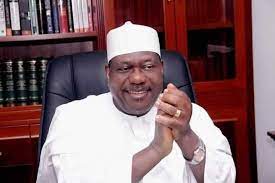It should shock no one, least of all, Sanusi Lamido Sanusi himself, that he was Thursday, February 20, 2014 suspended from office as the Chief Manager of the country’s economy, the Governor of the Central Bank of Nigeria (CBN), via a punchy presidential press statement.
The statement, issued by the Presidential Adviser on Media and Publicity, Dr. Rueben Abati, said the celebrated Kano Prince and Danmajen Kano was suspended from office to clear sufficient space there for government to conduct a thorough investigation into an alleged financial recklessness perpetrated by the apex bank under his governorship.
There is nothing so striking about the government of Nigeria suspending or sacking the head of any of its agencies over any form of alleged financial impropriety. Virtually, no agency of government in Nigeria can brandish any clean bill of health over some embarrassing, nay, appalling financial misdoings. So, suspending or sacking the head of any such agency over any allegation, or confirmation, of any form of this vice should be normal.
In the case of the CBN, the agency entrusted with the sole responsibility of managing the economy of the world’s most populous black nation and a front-row member of the Petroleum Exporting Countries (OPEC), suspending its governor to clear sufficient space for intensive investigation into an allegation of such vice is not only normal but very much welcome.
Any form and level of ‘financial recklessness’ by the CBN, the agency supposed to be the cleanest with regard to this misdeed, must not be condoned, nor go unpunished. Sanusi Lamido Sanusi must, therefore, not go unpunished. The government seems to say this with the sharp suspension it has smitten him with, which tends to imply that it could use anything sharper, akin to a Lancelot, to smite him as punishment if and when the outcome of the investigation demands.
Trust Nigerians! A larger section of them read some frightening, but very much expected, political meaning into the suspension of Sanusi, alleging that the whooping amount of money was intended by the Presidency to campaign for the victory of President Goodluck Jonathan at the 2015 elections.
With what a large population of Nigerians describe as an ‘unprecedented trustworthy, principled and disciplined posture,’ the Danmajen Kano took after his grandfather, Sarki Sanusi, by waging a fierce battle against the government represented by the Nigerian National Petroleum Corporation (NNPC) and the Federal Ministry of Finance over the non-remittance of some 20 billion Dollars (over N3 trillion) oil revenue to the government coffers.
Since July, 2013, Sanusi had been advancing forth in this battle with such tenacity that fascinates those ‘genuinely’ concerned about financial impropriety, but irritates the government and exposes it to public scorn.
For about seven months, the government, with the Minister of Petroleum Resources, Diezani Alison-Madueke, the NNPC top management, and the Finance Minister and Coordinating Minister of the Economy, Dr. Ngozi Okonjo-Iweala as weapons, and the virtually lone-fighter, Sanusi, had been firing salvos at each other at the battle ground, the National Assembly, hurling so many embarrassing accusations against each other over the non-remittance of the funds.
Sanusi conquered a chunk of the government territory by squeezing out $7 billion out of the $20 billion in question, and even succeeded in convincing the Senator Ahmed Mohammed Makarfi-led Appropriation Committee of the Senate over how to go about recovering the revenue accruable to government.
The government was deeply enraged for two reasons. One: It felt severely ‘shamed’ before the public, who now began to see the non-remittance of the funds as true after all, see the ‘nonentity’ Sanusi as vindicated, and hail him for a significant degree of victory.
Two: The loss of $7 billion out of the $20 billion ‘cornered’ was a bit too unbearable for it to let Sanusi go unpunished. Yes! He must be punished for causing government the loss of such a large amount of money out of the ‘electioneering campaign funds.
There is already a ready weapon usable to strike every Nigerian public office holder down: Allegation, or confirmation, of financial impropriety, however little the size.
The government had prepared and honed this weapon against the ‘holier than thou’ Sanusi waiting for the best time to smite him with it. If he behaves very loyally as required over the non-remitted funds, it would return the weapon to the armoury. If he behaves headstrong, it would strike him down with it to scoff him before the public. It believes in the strength of the advantage that no one fights with a constituted authority and succeed.
Whether for the alleged financial recklessness or for ridiculing the government before the public, Sanusi Lamido Sanusi’s suspension should, indeed, shock no one.



